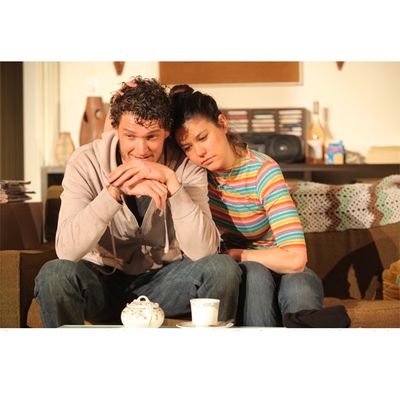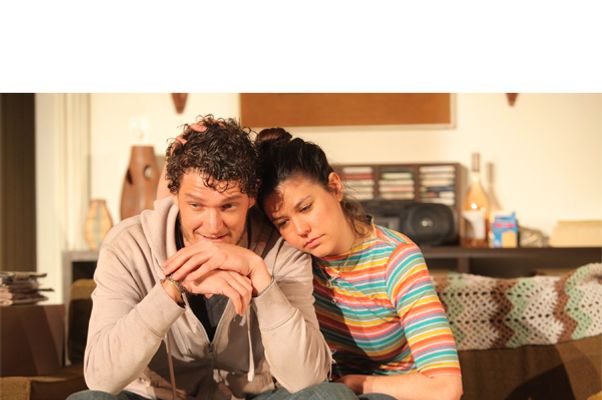

Amy Herzog’s 4000 Miles is, in some ways, every bit as unfinished-feeling as her After the Revolution, which opened (to, in my opinion, excessive acclaim) at Playwrights Horizons last fall. But Herzog’s latest genial clash-of-generations — about Leo, a principled, defensive neo-hippie (Brief Encounter’s Gabriel Ebert) in a state of grief-induced shock, and Vera, his unshockable eightysomething grandmother (Grey Gardens’ Mary Louise Wilson), who helps him heal — is several powers of ten more fascinating and entertaining. Part of this is due to Daniel Aukin’s extraordinarily deft and humane direction. He eases his players around Lauren Helpern’s exquisitely detailed apartment set on what feel like natural tides of light and jet streams of suppressed passion and anger. (The seasonally shifting illumination is by the excellent Japhy Weideman.) And much credit is owed the cast, especially Ebert and Wilson, whose a prickly warm interplay never hits a sour note. (You know everything you need to know about Leo’s state of mind from the way Ebert shouts, righteously and pathetically, into Wilson’s impaired ear, “[THERE’S] NO SUCH THING AS A LOCAL BANANA!” after she attempts to feed him with environmentally incorrect produce.) Ebert’s defensively blissed-out smile versus Wilson’s toothless moue: Who can deflect harder? Who can deny his or her loneliness longer? Waiting for the answer keeps you on the edge of your seat, for entirely un-plot-related reasons.
The biggest bouquets have to go to Herzog. True, her denouement is both soft and a little jury-rigged, her supporting characters (most notably an estranged girlfriend, played well by Zoe Winters) aren’t terribly fleshed out, and the long-awaited truth about what happened on Leo’s ill-fated cycling-and-soul-searching trip across America turns out to contain elements of the grotesque and absurd that the play isn’t really equipped to metabolize properly. But despite these rough patches, Herzog still marshals her greatest strength as a writer: illumining the very important things two very different generations have to say to one another, even when they’re withholding the important stuff, even when they’re talking past each other, even when one or both can’t or won’t listen. She’s also got a great ear for the coded distress signals of wounded do-gooders and guilt-addled first-world idealists. One day, she’s going to have a grand span of story to support all that lovely said-and-unsaid, sad-and-un-sad dialogue. For now, 4000 Miles will more than do.
Downtown at Michael Weller’s Side Effects, another mismatched couple lay into each other ferociously, feinting away from the truth one minute, lurching viciously into it the next. Unhappily marrieds Melinda (Joely Richardson) and Hugh (Cotter Smith) are the photo negative of the couple in Weller’s last two-hander, 2008’s Fifty Words. I missed that show (which starred Norbert Leo Butz and Elizabeth Marvel as troubled Brooklyn yuppies whose marriage dissolves before our eyes), but, on the page, it’s got a special viciousness that recalls the bloodsport of Albee and Shepard. (“We were just learning how to hurt each other back then. We were amateurs.”) Side Effects, which explores the crumbling home life of the Butz character’s troubled Midwestern mistress and her aspiring-politician husband, is a brawl that stubbornly refuses to get rolling. Melinda’s an unreliably self-medicated bipolar ex-poet with a gift for histrionics. “[It’s] not just the random behavior, it’s the whole thing,” moans Hugh, “the compulsive chatter, the performance — for who, what pretend audience is out there adoring every little twist of your mind, because the only one I see here is me.” But both of these folks have a secret: Lindy’s seeing Adam, a lover left over from her old life as a swinging New York bohemian; Hugh, masquerading as the perfect Calvinist hater of chaos, is actually more attracted to, perhaps even addicted to, his wife’s insanity than he lets on. There’s potential in this volatile mix, and Cotter is so good as a man so incredibly out of touch with his emotions, he’s a candidate for instant Über-menschhood. (He gets laughs and gasps out of lines that would turn to wood in a lesser actor’s mouth, and, for a while, he single-handedly produces the illusion of a better play.) But Melinda, as played by Richardson, is a real mess of a character. Her neurochemical instability feels like an excuse for the writer’s own inability to commit her to a course of action. Weller seems to be using the blank check of Melinda’s bipolar condition to trigger the same marital spat, over and over again; no one seems to adapt or learn from the beating they’ve received in the previous scene, and the play seems to start over again and again, constantly re-litigating the oldest and most normative male-female dynamic in history: Woman Passionate but Irrational and Inconstant; Man Cold, Controlling, and Suffering from Detached Amygdala. We keep waiting for Melinda and Hugh’s marriage to exhibit some truly jaw-dropping pathologies, but the most challenging aspects of their screwed-up union don’t surface until the end of the play, after Weller’s already shot his bolt and is in the process of winding down. Along the way, some beats fall shockingly short — news of a car accident that touches the family directly is received with odd and unfunny apathy and noodling argument, all of which feels more like an authorial/directorial flub than a strong, strange choice. (And one wonders why director David Auburn didn’t send Weller back to the drawing board after he read Miranda’s many hacky, one-sided cell-phone conversations, where already obvious plot points are eked out — and, inevitably, overheard.) At the end of the night, the side effects here are déja vù, dry mouth, dry heart, and dry brain.
4000 Miles, produced by LCT 3, is at the Duke on 42nd Street, 229 West 42nd Street, through July 2.
Side Effects is at the Lucille Lortel Theater, 121 Christopher Street, through July 3.

